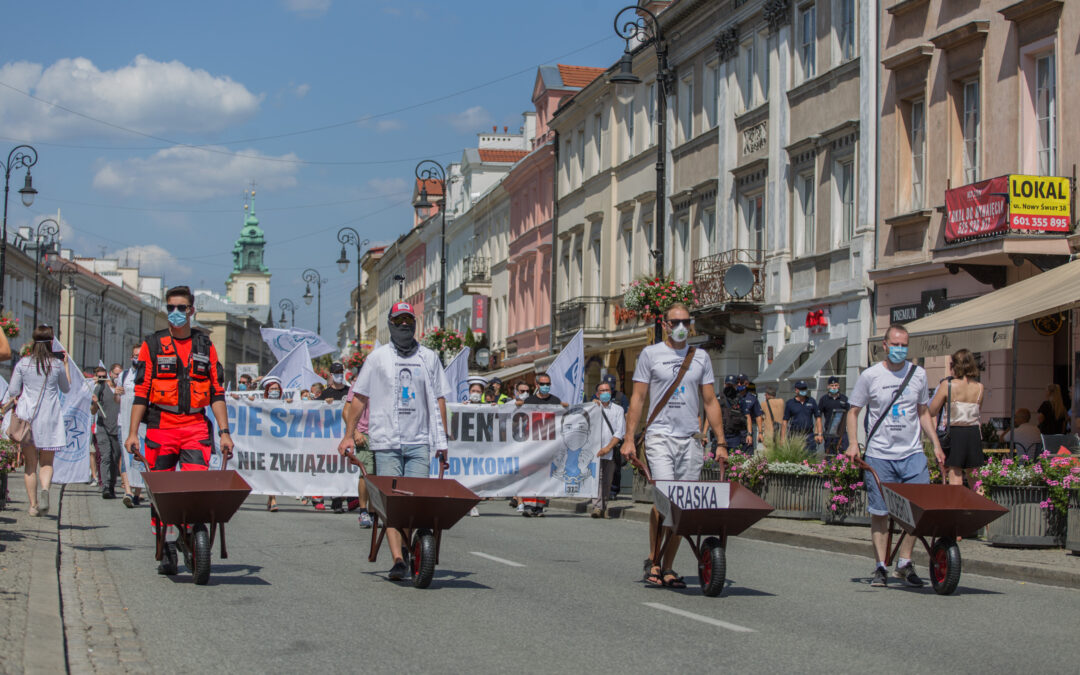Polish healthcare workers are planning to go ahead with a mass protest tomorrow, as discussions between unions and the health ministry over pay and conditions have failed to yield an agreement.
The medical workers have insisted on talks directly with the prime minister. But the health ministry has asked first for a concrete list of demands to “assess the costs” ahead of further dialogue today.
Poland has already this year seen protests by various medical professions. The country has one of the lowest levels of funding for healthcare in the EU and the fewest doctors in relation to population. The healthcare system has been further strained by the pandemic, with Poland last year recording the EU’s highest excess death rate.
Nurses in Poland recently held a "warning strike" after talks with the government over improved pay and conditions broke down https://t.co/craZr57bQz
— Notes from Poland 🇵🇱 (@notesfrompoland) June 30, 2021
The latest action has been called by a number of medical associations and unions, including the National Union of Nurses and Midwives (OZZPiP), Poland’s largest union of medical professionals, with around 80,000 members.
“Respect, safety and accessibility” is the motto of the protest. “It reflects all our demands,” Łukasz Jankowski, head of the Regional Medical Chamber in Warsaw, told Rzeczpospolita. “Respect means pay rises, and I mean decent ones (…) as well as keeping up promises and lack of propaganda in informing about our reality.”
These demands also include a larger and faster increase in state expenditure on healthcare, with a proposed rise to 8% of GDP, rather than the level of 7% planned by the government for 2027.
Moreover, healthcare workers expect pay rises to average levels in the OECD and EU relative to national wages, as well as an increase in the number of employees in the health system.
A National Protest and Strike Committee was called in August with the aim of holding a demonstration tomorrow in Warsaw. Medics plan on setting up a so-called “white town” outside parliament based around a big tent with daily conferences and debates, inspired by the month-long setup during a protest of nurses in 2007.
The medical organisations have already been in talks with the health ministry, as they sat down with its head, Adam Niedzielski, and his deputy, Waldemar Kraska, on Thursday in Karpacz, where the country’s leading economic forum is taking place this week.
1/2 Jako medycy i nie medycy, tworzący system ochrony zdrowia w Polsce, przyzwyczajeni jesteśmy do współpracy. Opartej na szacunku. Dlatego nie po końca podoba się nam gra, w jaką próbuje nas uwikłać @MZ_GOV_PL. Postulaty znane są od dawna, bardzo szczegółowe #OstatniGasiSwiatlo pic.twitter.com/BPFpugjsb7
— Komitet Protestacyjno-Strajkowy Ochrony Zdrowia (@protestmedykow) September 10, 2021
These have so far not yielded any agreement. “We did not receive any specific proposals for solutions to [the strike committee’s] demands,” said Artur Drobniak, vice-president of the country’s Supreme Medical Council following the talks.
The organisers of the protest have demanded the participation of Prime Minister Mateusz Morawiecki as a condition for further talks, which they say will continue on Friday in Warsaw.
The ministry asked the strike committee to submit ten priority postulates by email on Thursday evening so as to “estimate costs” ahead of continued talks on Friday.
Health ministry spokesman Wojciech Andrusiewicz said that the prime minister had been “acquainted with the demands” but was waiting for the ministry to check their financial viability. “We hope that these specific solutions will be developed in a short time,” said Andrusiewicz.
Various other organisations have pledged their support for the protest, including Agrounia, a farmers’ organisation that has also been holding regular protests for greater state support. On Tuesday it said it would “unite” with the healthcare protesters.
The Left (Lewica), Poland’s second largest opposition group, has also announced its support for the protest. Maciej Konieczny, an MP, said that the pandemic had shown “what a huge price we all pay for the underfinancing of health care and the fact that the staff is exhausted, not well-paid enough,” reports Polsat News.
However, the Supreme Pharmaceutical Council has announced that it will not take part. The organisation said that, while it was on board with demands for higher salaries for pharmacists, it “did not have the legitimacy and sufficient justification to take such radical actions”.
Main image credit: Adam Stepien / Agencja Gazeta

Maria Wilczek is deputy editor of Notes from Poland. She is a regular writer for The Times, The Economist and Al Jazeera English, and has also featured in Foreign Policy, Politico Europe, The Spectator and Gazeta Wyborcza.




















